Fishermen question apparent contradictions between whale conservation, offshore wind proponents
By Michael Clements
March 7, 2023
Updated: March 9, 2023
SWAN’S ISLAND, Maine—For more than 200 years, the Joyce family has weathered storms, the troughs and crests of the economy, and the inherent danger of working on the ocean to draw its living from the sea.
They wouldn’t have it any other way.
“I’ve always been immersed in this,” eighth-generation lobsterman Jason Joyce told The Epoch Times.
But after a lifetime of contending with nature, the lobstermen say they face new adversaries who threaten to end their way of life. Offshore wind corporations, with the backing of the federal government, plan to anchor towering windmills in the waters where they fish.
The wind corporations have, for years, funded environmental groups, which, in turn, have accused the lobstermen of endangering the North Atlantic right whale.
“They’ve been after us for 25 years now,” Galen “Sput” Staples, Joyce’s neighbor and a fellow lobsterman, told The Epoch Times.
Swan’s Island is roughly 80 square miles of hilly, forested land with a small harbor, picturesque homes, and an automated lighthouse.
Situated about six miles off the coast, the island is only accessible by ferry. The only hotel is the Harbor Watch Inn. The management advises customers to pick up groceries before catching the ferry, as there are no restaurants on the island.
Joyce and his fellow lobstermen gather in the Swan’s Island Fishermens Co-op most mornings for bad coffee and good talk.
Most learned their trade from their fathers and grandfathers; all have stories of setting their first traps as boys.
They grew up in the business working as “stern men” on their family’s boats until they could purchase their own. Some fish full-time, and some work side jobs. None of the lobstermen in the co-op can fathom doing anything else.
By law, Maine lobstermen are owner–operators. No corporate factory boats are fishing for Maine lobsters. Instead, the lobsters are caught by small craft, usually crewed by fewer than five people. That promotes conservation because a small operator is less likely to cut corners and risk his entire business, Joyce said.
But it also makes them easy targets for corporate interests who want to control the sea.
“We’re the little guy. We can’t fight back,” Staples said.
The lobstermen’s main tools have changed little since James Joyce dropped his traps in 1806. James would likely be able to captain Jason’s boat after just a little training. Today’s lobstermen use a trap, a buoy, and a line to connect the two, just as their ancestors did. This assembly is called a “haul.”
The lobsterman baits the trap and drops it to the bottom of the sea. The buoy marks the trap’s location and identifies who set it. The line connecting the buoy to the trap enables the lobsterman to retrieve the trap. And that line is the crux of the accusation by the environmental groups.
A host of wildlife conservation and environmental groups, along with the National Oceanic and Atmospheric Administration (NOAA) and the National Marine Fisheries Service, are calling to eliminate those lines to protect the North Atlantic right whale.
The NOAA claims that a significant factor in whale mortality is human encounters. According to the agency, the whales become tangled in the lobster trap lines, hindering movement and causing injuries that can lead to death.
The NOAA website reports that 97 right whales have had dangerous and sometimes lethal encounters with humans since 2017.
Of that number, 36 were killed, 22 were severely injured, and 38 received survivable injuries. Government agencies and environmental groups responded by springing into action.
Of the 36 deaths documented by NOAA, only nine involved entanglements. And of those, not a single one was linked to Maine lobster gear.
Environmental and animal rights groups have mounted campaigns to save the right whale that have generally portrayed the seafood industry and the lobstermen as hostile to it. As a result, in November 2022, Whole Foods decided to stop selling Maine lobster in its stores.
The grocery chain stated that it made the decision based on information from California-based Monterey Bay Aquarium Seafood Watch and the London-based Marine Stewardship Council.
Both groups claimed that the method of fishing for lobster is unsustainable and endangers whales.
The National Marine Fisheries Service began issuing regulations to save the whales.
Lobstermen were required to use nonfloating lines on their traps to reduce the chance of entanglement. If a buoy becomes separated from a line, the line will sink to the bottom, reducing the possibility that a whale or some other animal will become entangled.
It also virtually ensures the lobsterman will lose that trap.

Maine Gov. Janet Mills in 2019. (Rebecca Hammel/U.S. Senate/Public Domain)
Lobstermen are also required to use “weak links” in their lines. These are sections designed to separate if too much pressure is placed on them. The idea is for a whale to be able to pull itself free if it becomes entangled.
Then, the government wrote rules requiring all lobstermen to increase the number of traps on each haul. The logic behind this rule is that more traps on each line mean fewer lines in the water.
These rules are part of a 10-year plan to require lobstermen to reduce the risk to whales by 98 percent by 2024.
According to the Maine Lobstermen’s Association, its members have done their best to comply with the rules because they want to be good stewards of the environment; however, they say a 98 percent reduction is an impossible goal.
The association sued to block the government’s plan but lost its lawsuit.
Maine’s U.S. congressional delegation inserted a provision into the 2023 Omnibus Appropriations bill that delays the rule until December 2028 and recently a move has been made to repeal that section of the bill.
Rep. Raul Grijalva (D-Ariz.), the ranking Democratic member and former chairman of the House Natural Resources Committee, on Feb. 27 introduced the “Restoring Effective Science-based Conservation Under Environmental Laws Protecting Whales Act of 2023,” or the “RESCUE Whales Act.”
A spokesman from Grijalva’s office said there’s no need for the delay in enforcing the 98 percent reduction requirement, since the omnibus bill also provides funding to assist lobstermen in transitioning to new, ropeless fishing gear.
“We want to continue to incentivize the deployment of this technology and get it in the water as quickly as possible, which is why Rep. Grijalva championed the passage of $20 million in funding in the FY 2023 omnibus to help transition the lobster fishing industry to ropeless gear,” Jason Johnson, Grijalva’s communications director, wrote in an email to The Epoch Times.
However, the lobstermen say that ropeless technology hasn’t been widely tested and is very expensive.
Joyce said Grijalva should probably be focused on issues closer to home.
“Why don’t you introduce a bill to assist the enforcement needs of Cochise County [Arizona] Sheriff Mark Dannels in managing your border and leave Maine Lobstermen alone as we continue to maintain a perfect record of zero right whale deaths ever, and zero entanglements since 2004,” Joyce wrote in response to Johnson’s email.
Joyce and his fellow lobstermen don’t dispute NOAA’s whale numbers, but they say those numbers don’t tell the whole story. The lobstermen claim that the government ignores scientific evidence that right whale migration patterns have changed and the whales are moving further away from Maine.
“Simply put—the federal government is wrongly holding Maine lobstermen accountable for the decline of the right whale population,” the Maine Lobstermen’s Association website reads. “Its plan will end the Maine lobster fishery but won’t save right whales.”
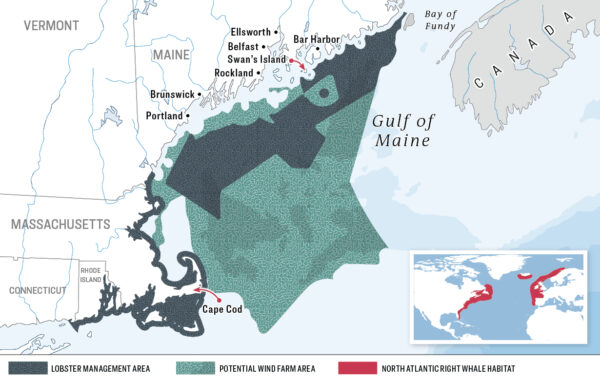
A map shows the overlap of lobster fishing areas, potential offshore windmills, and the North Atlantic right whale migration pattern in the Gulf of Maine. SOURCES: Bureau of Ocean Energy Management, Maine government, National Oceanic and Atmospheric Administration. (The Epoch Times/Shutterstock)
Amid all this, the offshore wind lobby has entered the fray.
Maine Gov. Janet Mills, a Democrat, has voiced support for her state’s lobster industry. But she also plans for Maine to get 100 percent of its electricity from “green” energy sources by 2040. A major element of her plan is offshore wind.
The Biden administration is also pushing ahead with its plan to promote offshore wind, and the Gulf of Maine, where the lobstermen of Swan’s Island live and work, is part of that plan, according to the U.S. Department of the Interior.
In August 2022, the Bureau of Ocean Energy Management announced a “request for interest” to assess interest in the development of commercial wind energy leases within a 13.7-million-acre area in the Gulf of Maine, according to the Department of the Interior. It has already invested $80 million to collect baseline information in the Atlantic Ocean and the Gulf of Maine.
The lobstermen say windmills would ruin their fishing grounds, decimate their industry, and pose a more significant hazard to whales.
However, Mills says that the two can coexist.
Developments further down the Eastern Seaboard are raising questions about the effect that windmills would have on the ocean and sea life even before the first windmills are operational.
Since December 2022, at least 25 whales have turned up dead on beaches in New York and New Jersey. Whales also have washed ashore in Maryland and Virginia.
Some say the deaths have coincided with seismic surveys for offshore windmill construction; there is concern that sound from the testing interferes with whales’ ability to navigate and may damage their ears.
Three congressmen and more than a dozen mayors whose coastal districts are near offshore wind energy sites are calling for a moratorium on new Atlantic Coast projects until a thorough investigation into a recent spate of whale deaths can rule out wind farm activity as the cause.
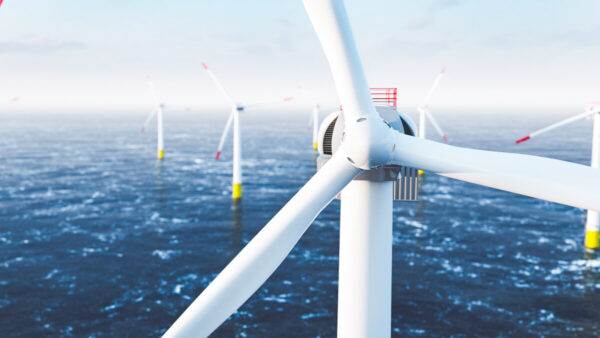
Offshore wind farm. (Photocreo Bednarek/Adobe Stock)
The NOAA and pro-offshore wind factions say there’s no evidence of any connection between testing for offshore wind development and whale deaths. However, that’s not to say there’s no effect at all.
During a media teleconference on Jan. 18, representatives from the National Marine Fisheries Service, NOAA, and the Bureau of Ocean Energy Management took questions from reporters about whale deaths and the offshore wind work.
One of the speakers acknowledged that the testing might have some effect, although he said it wasn’t connected to mortality.
“I think the way we’ve been describing it … it has the potential to have a behavioral influence,” said Brian Hooker, biology team lead with the Bureau of Ocean Energy Management’s Office of Renewable Energy Programs. “And that’s what’s the very effect that we anticipate could occur.”
Benjamin Laws, deputy chief for the permits and conservation division for NOAA Fisheries Office of Protected Resources, was quick to interject.
“Well, I just want to be unambiguous, there is no information that would support any suggestion that any of the equipment that’s being used in support of wind development for these site characterization surveys could directly lead to the death of a whale,” Laws said.
Environmentalists have raised concerns about seismic testing in the oil industry for years. But seismic equipment used by offshore wind interests differs from that in the oil industry, according to Erica Staaterman of the Bureau of Ocean Energy Management’s Center for Marine Acoustics.
Offshore wind equipment is smaller, quieter, and more focused than that used by oil and gas, she said.
“So, for example, many of them are used for very short periods of time with a long quiet time in between. So that means that they’re only on for several milliseconds, and then for about 15 seconds, it would be quiet,” Staaterman told reporters.
Scientists are investigating the recent whale deaths and will continue doing so, NOAA spokesperson Lauren Gaches said in a statement to The Epoch Times. She said there’s no conclusive evidence that seismic surveys caused any deaths.
“Strandings and inconclusive necropsies have occurred long before offshore wind was a factor, so correlating the two now is not based in science,” Gaches wrote. “Necropsies can take weeks to months to complete the tissue sample analyses, so that work remains underway.”
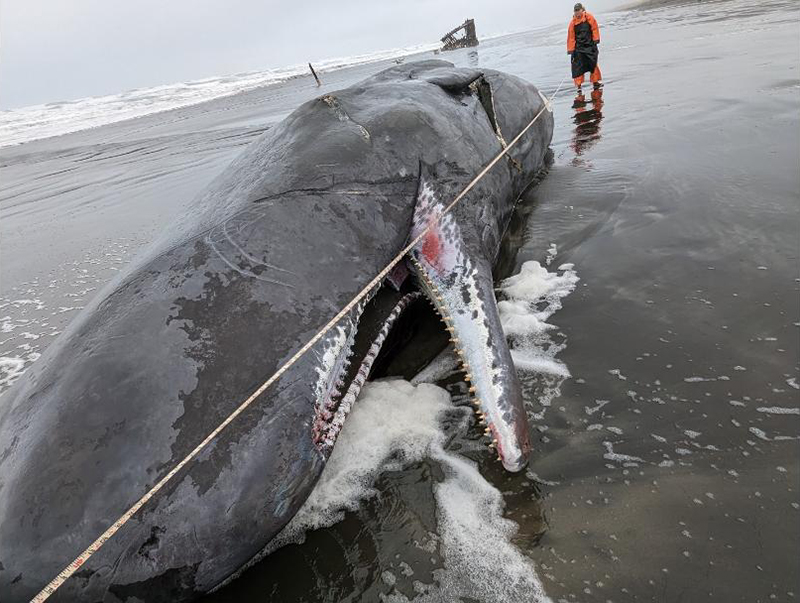
A whale carcass washed up on the Oregon coast on Jan. 14, 2023. (Courtesy of National Oceanic and Atmospheric Administration)
Joyce noted that many environmental groups that have been critical of lobster traps are silent regarding surveying. Some have even voiced support, saying that offshore wind development is necessary to counteract climate change.
He’s curious how a temporary line from a lobster trap is a hazard to whales, while permanent underwater cables, pilings, and related infrastructure for hundreds of offshore windmills aren’t an issue.
According to a report by the “Save Right Whales Coalition,” there may be more than climate change concerns behind the environmentalists’ position.
The group is a coalition of people along the East Coast who are concerned about offshore wind development’s impact on the ocean and their coastal communities. The group published its report, “Conflicts of Interest: Environmental Organizations Take Offshore Wind Industry Money,” on its webpage.
“A recent investigation found many conservation groups accept millions of dollars in donations from the offshore wind industry,” the group wrote.
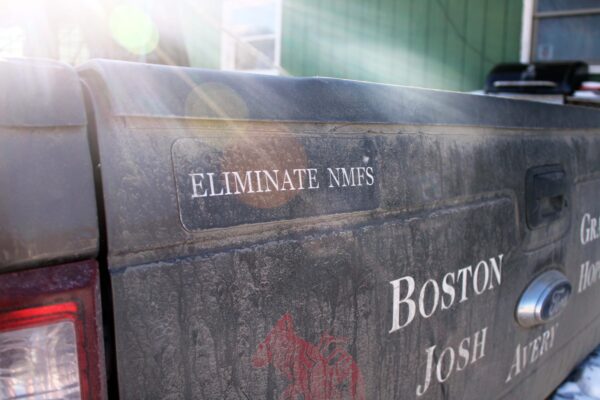
One Swan’s Island lobsterman uses his truck to express his feelings about the National Marine Fisheries Service on Feb. 26, 2023. (Michael Clements/The Epoch Times)
Danish wind energy company Orsted Global donated $500,000 to U.S.-based nonprofit Woods Hole Oceanographic Institute in 2018, according to the latter’s website.
The following November, the institute announced that it was “excited to use Department of Energy funds to make offshore wind more sustainable.”
Orsted, along with energy company Eversource, donated $1.25 million to Mystic Aquarium, a marine aquarium in Connecticut, according to Eversource’s website. Eversource serves customers in Connecticut, New Hampshire, and Massachusetts.
Mystic Aquarium reportedly used the funds to build a state-of-the-art exhibit and finance media projects promoting wind, solar, geothermal, and other renewable energy sources.
“In November 2021, the aquarium developed a video titled ‘The Promise of Offshore Wind,’ with Orsted listed as a ‘supporter’ in the credits,” the report reads.
Federal Agencies Involved
In 1984, the federal government founded the National Fish and Wildlife Foundation as a 501(c)(3) corporation to connect public projects with private financing to preserve wildlife and habitat.
In 2019 and 2020, energy company Avangrid Renewables gave between $100,000 and$499,999 to the National Fish and Wildlife Foundation, the report states.
According to a statement on its website, the National Fish and Wildlife Foundation entered an agreement in 2021 with U.S.-based wind company Apex Clean Energy. Under the agreement, Apex would donate to the foundation $1,000 per megawatt of generating capacity that Apex commercializes, and the foundation would match the donation dollar-for-dollar to finance grants.
On its website, the National Fish and Wildlife Foundation includes a link to a program to protect whales from entanglement in fishing gear but makes no mention of possible threats from the offshore wind industry, according to the report.
‘You Guys Aren’t Concerned About Whales at All’
While the local activists may be motivated by good intentions, Sawyer Spencer—a lifelong lobsterman and a regular at the co-op—doubts the motivations of the moneyed interests. He told the co-op gathering that his view was summed up by a fisherman he saw quoted on a local news broadcast.
“He said, ‘You guys aren’t concerned about the whales at all,’” Sawyer said.
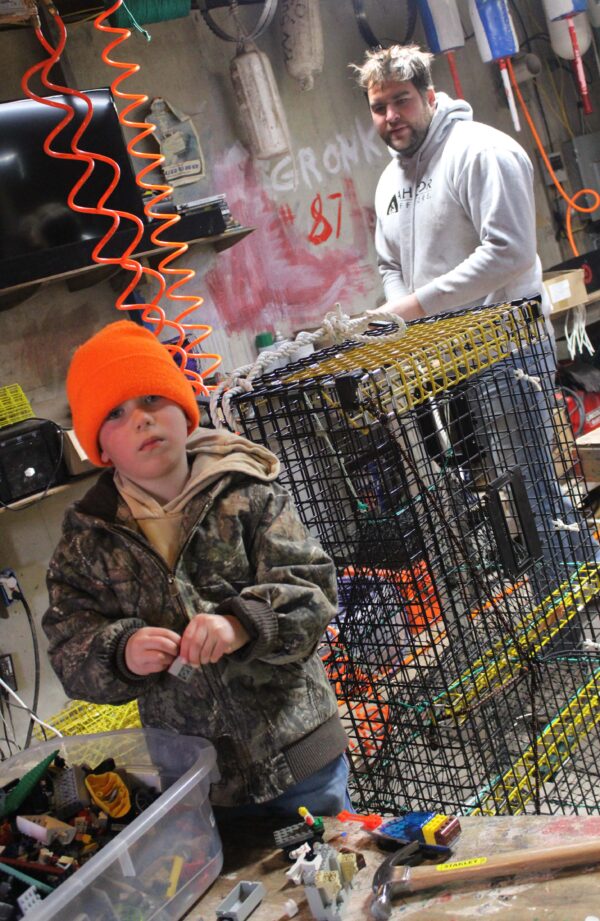
Elias Joy (L), 4, of Swan’s Island, Maine, plays with building blocks as his father, Samuel Joy, prepares his lobster traps for the coming fishing season on Feb. 25, 2023. (Michael Clements/The Epoch Times)
Samuel Joy is a 30-something island native and the son of a minister who has spent his life lobstering.
One cold February morning, Joy built new lobster traps in front of a wood-burning stove as his 4-year-old son Elias played with building blocks, and Joyce, his father-in-law, watched from a chair near the stove.
Joy is an amiable, friendly man with dark hair and a calm demeanor. Like the other lobstermen who spoke with The Epoch Times, he said he’s all for conserving whales and wants to preserve the environment. He also wants to maintain the life and work that he loves.
“I’ve been fishing every summer since I was 5 years old. I want to give [Elias] as much opportunity as I had when I was a kid,” he said.
Joy says that he’s cautiously optimistic and is quick to answer when asked if he would recommend that a young man consider lobstering as a vocation.
“Just fish until they make you stop,” he said.
Sawyer said the negative effect of implementing the whale regulations and establishing offshore wind farms would extend beyond just displacing the lobstermen. Considering the ancillary jobs connected to lobstering, the economic impact could devastate the coastal communities and beyond.
“The whole state of Maine is going to be displaced,” Sawyer said. “What we’re doing is trying to survive.”
Weblink to article, photo and comments:
https://www.theepochtimes.com/maine-lobstermen-face-extinction-thre...
As Whale Deaths Mount, Jersey Shore Leaders Warn ‘Green’ Wind Farms Will Destroy Their Home
https://www.breitbart.com/environment/2023/03/08/exclusive-as-whale...
Views: 141
Comment
© 2026 Created by Webmaster.
Powered by
![]()
You need to be a member of Citizens' Task Force on Wind Power - Maine to add comments!
Join Citizens' Task Force on Wind Power - Maine